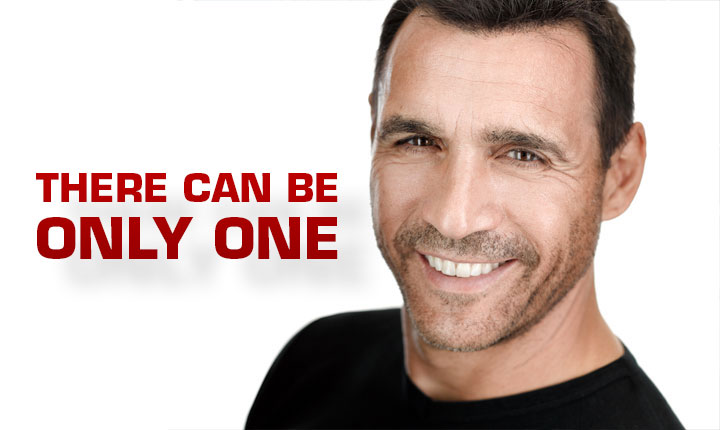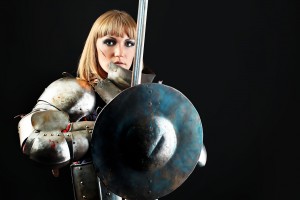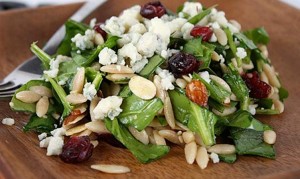We here at Modern Gladiator are always looking for men and women who embody the MG philosophy—individuals passionate about what they do and develop a life that finds fulfillment and balance between family, work, lifestyle, and charity. I think we’ve found a terrific example this month with family man, philanthropist, and director/actor Adrian Paul. He recently sat down with our entertainment editor, Scott Tallman, to talk about his career, family, and what he thinks makes a modern gladiator.
Adrian Paul Interview
 Born in London, one of three boys, to an Italian mother and British father, Adrian Paul was a typical British boy. A self-described soccer fanatic, he excelled at the sport throughout his youth until at the age of 18 when a girlfriend entered him into a contest called “Can your boyfriend be a male model?” which he won. From that contest he got a contract with an agency and began modeling, dancing, and choreographing throughout Europe until 1984, when the agency sent him to New York City where the acting bug began to take hold. Working in the U.S. eventually brought him to Los Angeles, where he intently studied acting and realized it was his calling. After a year, he landed his first major job playing Nikolai “Kolya” Rostov in the hit series The Colbys.
Born in London, one of three boys, to an Italian mother and British father, Adrian Paul was a typical British boy. A self-described soccer fanatic, he excelled at the sport throughout his youth until at the age of 18 when a girlfriend entered him into a contest called “Can your boyfriend be a male model?” which he won. From that contest he got a contract with an agency and began modeling, dancing, and choreographing throughout Europe until 1984, when the agency sent him to New York City where the acting bug began to take hold. Working in the U.S. eventually brought him to Los Angeles, where he intently studied acting and realized it was his calling. After a year, he landed his first major job playing Nikolai “Kolya” Rostov in the hit series The Colbys.
MG – Was there much of a struggle in the early years of acting? It seems like things happened pretty quickly.
AP – When I was in New York, I had thirteen dollars in my pocket. This has happened several times in my life where I was at rock bottom and had absolutely nothing. Coming to L.A., I realized you have to work for what you got. I always say to people your dreams as a child never come true: As you go through life, you have decisions to make along the way. Your dream comes based on the decisions you’ve had to make, so you can’t complain about what your life is like. Your dream may come true, but differently than originally expected.This has happened several times in my life where I was at rock bottom and had absolutely nothing.
MG – Did you question yourself during any of those lows?
AP – I’ve been through some very dark forces in my life. I don’t think I’m the only one. But you have to understand that there’s always a light and if you believe in what you do and you’re focused and proactive in what you want, something will happen for you. It’s inevitable; you’re creating your destiny. I tell my children, “Don’t ever give up.” Kids always persevere—that’s what makes them so great.
MG – Going back to The Colbys. It was your first national American booking, and the show was huge. Were you recognized on the street immediately? Were you able to go to the grocery store one day and not the next?
AP – It was something that happened gradually. I think people really recognize an actor after a show has been on the air two or three years. I was recognized a lot by Russians, as I had played a Russian ballet dancer.

MG – You then worked steadily until you were cast in the career-making role of Duncan MacLeod in Highlander. The show ran for six years and one hundred and twenty episodes. What is it like living in the same character for six years?
AP – The funny thing was it really wasn’t. The great thing about doing Highlander was I wasn’t doing the same character every week. Every week was different, as he had 400-something years to go through. A flashback to 1780, compared to one in 1920, he would be completely different in how he held himself and what he believed. It was a great opportunity to almost play a different character each week.
MG – I know you have martial arts training in karate and Tae Kwon Do. Did you start training before Highlander?
AP – I first started doing kickboxing about a year or two before Highlander. My trainer was ex-military and he used the sword and I got to understand what the sword was. When I got into Highlander I started training in Hung Gar Kung Fu with my Sifu Vernon Rieta, who I later studied with for twenty years. I also studied the people who came on the show and I would learn things from them. I was really in training every day [on Highlander] because I was fighting and learning. So my sword work and my martial arts improved as the show went on.
MG – With a show being on the air six years, there’s the financial success that comes with that. When did you feel like you had made it both financially and spiritually?
AP – I don’t think I made it spiritually until after Highlander. Financially, things were definitely looking better after the second season. It gave me a certain financial security and the ability to start looking at the world and things I should be focusing on. After the sixth season I was in a very good place.
I would say you are only as good as your last job because fame can come and go very quickly.
MG – After coming from having only $13 in your pocket, how did you learn to manage your finances?
AP – I wish I understood then what I know now because I lost a lot of money. It wasn’t squandered; it was embezzled mainly because I was naïve in how to structure things. I had a business management company that would invest me in portfolios and stuff, but I also had cash that I was able to invest and there were some bad investments I made.
MG – Your embezzling story is not an uncommon one. Performers spend so much time honing their craft, but then get into this corporate world and they lack the skills to handle that. Do you agree? What advice would you offer to anyone coming out of drama school today?
AP – I would say you are only as good as your last job because fame can come and go very quickly. The great thing about our business is that it can make you within a period of months, literally. So you have to be aware that this money, this fame will fade in about 85 to 90 percent of the cases. What was hot today might not be hot tomorrow. Your agent and mangers are in this not for your career, but for their business. They need to keep their jobs and take care of their families. They will push those people who will bring money to their agencies. You have to be aware of who you are and what you have to offer.
MG – In 1997 you founded the organization PEACE Fund with its mandate is to help children everywhere. Why did you start the organization rather than getting involved with existing organizations?
 AP – Even when I was very young I knew I was supposed to do something with children. My fan club was called Peace so I decided to create the PEACE Fund. PEACE stood for Protect, Educate, Aide Children Everywhere. It was so simple that it took fifteen minutes to decide that name. I had been lucky enough to be involved with Shaquille O’Neal and Athletes & Entertainers for Kids. They actually helped me form the PEACE Fund by aiding me in formulating a program called School Makes A Difference, where I took celebrities and corporate America into schools to really focus on the issues that school needed.
AP – Even when I was very young I knew I was supposed to do something with children. My fan club was called Peace so I decided to create the PEACE Fund. PEACE stood for Protect, Educate, Aide Children Everywhere. It was so simple that it took fifteen minutes to decide that name. I had been lucky enough to be involved with Shaquille O’Neal and Athletes & Entertainers for Kids. They actually helped me form the PEACE Fund by aiding me in formulating a program called School Makes A Difference, where I took celebrities and corporate America into schools to really focus on the issues that school needed.
After the 2002 tsunami I realized that I had another opportunity with PEACE Fund by raising money for issues. At the time, my brother had been involved in the tsunami in Asia—his island lost a couple thousand people and we went in to help the children who had lost their parents, their homes, their school equipment, clothes, everything. We were able to raise money with Highlander merchandise, etc., and we gave the money to an organization there on the ground. Since then, we have helped with funding initiatives and partnering with other charities.I had another opportunity with PEACE Fund by raising money for issues.
The PEACE Fund has changed since that and now is growing exponentially. A year and a half ago we launched PEACE Fund radio, which brings the public’s attention to other charities. Right now we have about one and a half million listeners. I’m now collaborating with Microsoft to create a place where charities can come together called the PEACE Fund Hub, where like-minded charities can share ideas and solutions.


MG – Where can our readers find PEACE Fund Radio?
AP – If you search for PEACE Fund Radio anywhere, it will come up. You can go through www.latalkradio.com/Peace.php. We are also launching our very first fundraising events. We are partnering with the David Frey Memorial Fund for a golf tournament in August, and in October we have a poker tournament with Microsoft. Our biggest event will be in November, the PEACE Fund Games. The two-day event is a celebrity paintball competition where celebrities can actually win cash for their charity. We’re working with SC Village, one of the largest paintball playing fields in Southern California, and just recently through the initial interest and the amazing people coming on board, we are attempting the world record for the largest celebrity paintball competition in the world. You can find out about it at www.thepeacefundgames.org.
MG – In addition to founding PEACE Fund, you’ve co-founded a company called Filmblips, Inc. I love the motto “a good foundation makes success attainable.” Why did you co-found Filmblips? Any projects you want to share with us?
AP – We started about four or five years ago with the goal of bringing smaller films and funding them in a different way. We went back to a more traditional method of funding film with the right scripts, the right people, and the right distribution attached. We have a series we are currently looking at show runners for. We are very close to funding a few of our projects over the next year.
MG – What have you learned being on this side of the business that surprised you coming out of the performing/acting side of the business?
AP – I think it is a balance of the creative and the financial aspects. If you have an investor in your movie, they’re not going to give you money if you’re going to lose it. So as a director or actor, if you want to spend more time on a shot, it may not be in the budget. You have to change it or adapt it based on that fact. The producers have tried as much as possible to calculate the return on their investment.
MG – I think that’s true of anything artistic. There’s that line of commerce meets creativity.
AP – The industry has changed dramatically in the last ten or fifteen years. Everybody has now found different forms of releasing and funding projects. You can’t rely on DVD sales anymore. As a business model, you have to look at your back end—how are you actually going to make your money back? Obviously your distributors are key to that. When you’re delivering your project, you have to know where you’re actually going to sell it and what platform(s) you’re going to put it on.
MG – Let’s talk about your personal life. You’re currently married to Alexandra Tonelli and have two young children. How do you enjoy being a father?
 AP – I love it. I never understood when somebody would say to me “You don’t understand what it’s like being a father.” You don’t get it until you become a father or mother. You have this little entity is an extension of you and the love you get is unconditional…at least up to a certain age. It has changed my outlook on life—now it’s no longer just about my career, or what I want to do. I have to think about what’s best for my kids. It changes your life entirely.
AP – I love it. I never understood when somebody would say to me “You don’t understand what it’s like being a father.” You don’t get it until you become a father or mother. You have this little entity is an extension of you and the love you get is unconditional…at least up to a certain age. It has changed my outlook on life—now it’s no longer just about my career, or what I want to do. I have to think about what’s best for my kids. It changes your life entirely.
MG – Has fatherhood increased or decreased your dedication to PEACE Fund? Have they given you new insight?
AP – I reference them a lot on my show because we talk about everything with kids. There are certain issues we might want to focus on with the PEACE Fund that come directly from experiences with my kids.
MG – In having kids and being part of the entertainment industry in Los Angeles in 2014, how do you instill values in your children? Your oldest is four years old. What are you trying to teach them in this day and age?
AP – A lot of people say to me that my children are very well mannered. Aren’t all kids supposed to be that way? I was brought up like that. You said “please” and “thank you” and had respect for those around you. That’s what we try to teach. Your kids are a reflection of you.
MG – You had your kids a little later in life. Is there an advantage to that? Are you enjoying them more?
AP – I was able to do a lot of things that I wouldn’t have been able to do if I’d had kids. I lived a very selfish life in a sense. There was nobody else I really had to answer to except a girlfriend or wife. I had a freedom to say “Let’s go to Guadalupe or Europe this month,” but you can’t do that with kids. Now I’m always thinking to myself how old I’ll be when my kids are playing soccer or baseball or basketball and I wonder if I’ll be able to keep up with them physically.
MG – What’s your fitness regime like these days?
AP – I train smarter than I used to. This past year it has been very difficult to train. When you have kids, it’s very hard with sleep patterns changing, school schedules, and everything else you have to do. You have to stabilize your structure and your foundation, which yoga has been able to do for me. It’s strengthening me, allowing me to do more physical stuff so I can start going to the gym and doing martial arts. It’s a balance you have to know what you are and what you need.
When you have kids, it’s very hard with sleep patterns changing, school schedules, and everything else you have to do.
MG – You have a successful career, you have young children, you have a wife, Filmblips, and your non-profit work. How do you balance your life? How do you find time to sleep?
AP – Well, I think knowing your priorities is the answer to that. I have so much going on and when I start filming it’s only going to get worse so I need to be very organized. You have to have the right people around you as well. My wife understands that I go to work and spend a lot of time in my office, although right now I’m not doing the weekends. You also have to balance your time with your kids and being physical. My kids are going to grow up; I have to spend time with them.
MG – That means saying no to certain things or people. Is that hard for you?
AP – Yes it is. You don’t like to turn work down, but when you have kids, you think if it’s going to take me away from the kids. But you have to make the decision. I turned down a series in England just recently not because I didn’t like the project, but moving my entire family there didn’t make sense. Saying no is hard, but it’s necessary.
MG – One final question. Can you tell our readers what you think it is to be a modern gladiator?
AP – There are a lot of modern gladiators out there. I think it is to be balanced in all the things that make you a whole person—the physical, spiritual, mental, intellectual, and sexual elements that make up every human being on this planet. A modern gladiator is balanced in all of those things. They know their family, their business, their hearts are all progressing them in this life as to what they are supposed to be doing.
MG – Thank you so much for sitting down with us!
Related Posts
One Response to Gladiator Spotlight: Adrian Paul
Leave a Reply
You must be logged in to post a comment.
« What is Kinesiology Tape? And Should You Be Using It? Ramp Up Your Sales! 14 Powerful Sales Tips »











Very Nice interview. thank you.
http://www.adrianpaulnewswire.blogspot.com